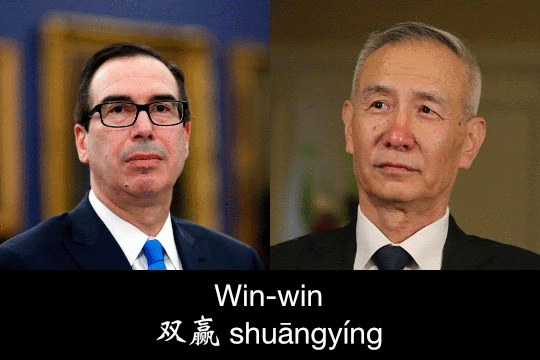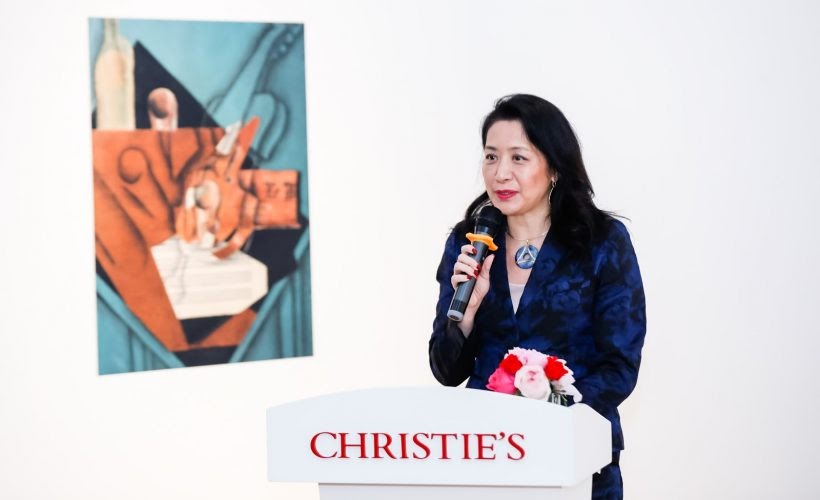Not with a bang but a whimper



 1. The trade war is on hold, back to status quo ante
1. The trade war is on hold, back to status quo ante
Xinhua News Agency reports: “Chinese President Xi Jinping’s special envoy and Vice Premier Liu He 刘鹤 said [in Washington, D.C.,] Saturday that China and the United States have reached consensuses on economic and trade issues, pledging not to engage in a trade war.” Liu called the result a “win-win choice.” The New York Times saw it differently (paywall):
Chinese negotiators left Washington this weekend with a significant win: a willingness by the Trump administration to hold off for now on imposing tariffs on up to $150 billion in Chinese imports. China gave up little in return, spurning the administration’s nudges for a concrete commitment to buy more goods from the United States, and avoiding limits on its efforts to build new high-tech Chinese industries.
-
The South China Morning Post agreed, arguing, “From intellectual property to the trade gap, China appears to have given a little, but got a lot in return.”
The Trump administration has pushed back against this notion: The South China Morning Post reports that the president himself claimed earlier today that China had agreed to buy “massive amounts” of American agricultural products — “practically as much as our farmers can produce” — while Treasury Secretary Steven Mnuchin “said the talks has yielded tangible benefits, adding that Commerce Secretary Wilbur Ross would make a follow-up visit to Beijing next week to put a framework agreement in place.”
“There’s no agreement for a deal,” clarified White House economic adviser Larry Kudlow to ABC, adding, “There’s a communique between the two great countries, that’s all.”
Former Trump adviser Steve Bannon “condemned a weekend truce in the U.S. trade dispute with China as a capitulation, signaling dissatisfaction among the president’s allies,” according to Bloomberg.
Commentary — what happened?
Why did Trump back down and what is actually going on? The internet suggests a few possibilities:
-
Chinese social media users have been sharing an image (reproduced above) that contrasts the scene at the weekend’s trade negotiations with a photo of Chinese officials signing an agreement to end the Boxer Rebellion in 1901, one of the lowest points of China’s “Century of Humiliation.” In the earlier photo, the Chinese negotiators are a crew of silver-haired ancients; in this weekend’s photo, it’s the Americans who sent their elderly. See the New York Times (paywall) for more, or one of the original Chinese Weibo posts and comments (in Chinese).
-
Economist Paul Krugman tweeted four possible reasons for Trump’s change of heart:
1. Someone finally explained the economics to Trump.
2. Trump just lost his nerve.
3. Trump got a personal payoff.
4. The Chinese also have a tape.
The thing is, while 1 is wildly implausible, 2-4 all seem quite possible. -
“A trade war means the Dow goes down, way down. And aside from blonde bimbos and Fox and Friends, the stock markets are the only thing Trump cares about.” That is an explanation I heard in January for why Trump would not be able to follow through on tariff threats. Sure enough, “Stocks rise, investors cheer easing trade tensions” is today’s note from Bloomberg at the close of the Asian and U.S. markets.
—Jeremy Goldkorn
2. China reaches for dark side of the moon
China has long been playing catch-up to the U.S. and Russia in the space race. It leveled with them in two key metrics in the past 15 years, by putting a man into space in 2003, and achieving a soft lunar landing in 2013.
The long march to space has continued — the country launched its second iteration of a space station, Tiangong-2, in 2016, and is making progress toward a permanently manned station by 2022. Today brings news of yet another milestone:
-
A satellite bound to orbit the moon named Queqiao (鹊桥 quèqiáo; “magpie bridge”) blasted off from Sichuan Province on May 21, the Guardian reports.
-
The name “comes from a Chinese folk story in which an arc formed by birds reunites two lovers separated by the heavens,” the Guardian explains. The name of that story is The Cowherd and the Weaver Girl (牛郎织女 niúláng zhīnǚ).
-
Queqiao will connect the dark side of the moon to a signal from Earth, allowing China’s Chang’e 4, a lunar lander and rover, to later this year explore a part of the moon where not even robots have gone before.
-
State media pumped up the satellite news with a four-minute video (in Chinese) of the preparations for and footage of the launch, plus video graphics showing the satellite’s function.
But it’s not just the Chinese government’s space program that is accelerating — private firms are shooting for the sky, too.
-
OneSpace became the first private Chinese company to launch a payload-carrying rocket last week. See a video of the launch on The China Project.
-
i-Space launched a lighter rocket last month, sans payload, beating OneSpace to the punch for being the “first private Chinese company to launch a space rocket.”
-
Both of these are private, Beijing-based startups, and while there is no doubting the talent on their engineering teams, aerospace experts told both AFP and CNN that these companies had “cut corners.”
-
“Onespace and iSpace…[used] retired Chinese missiles,” Jonathan McDowell, an astronomer at the Harvard-Smithsonian Center for Astrophysics, told AFP.
-
At The China Project’s NEXT CHINA conference in January, former NASA astronaut Leroy Chiao said that we are beginning to see startup companies in space technology in China, but so far, they are lacking technical experience and realistic plans.
—Lucas Niewenhuis
 BUSINESS AND TECHNOLOGY:
BUSINESS AND TECHNOLOGY:
-
Gray rhino (?) resurgent — Fosun
Fosun is to expand its North American foothold by investing heavily in tourism / SCMP -
Lesser-known gray rhinos continue to decline
CEFC defaults on 2 billion yuan of bonds as fallen oligarch’s asset-buying firm goes rudderless / SCMP -
Monetizing on-demand bikes
Ofo starts selling ads on bikes and in apps / TechNode -
Artificial intelligence and its uses
Beijing metro will soon support facial recognition / TechNode -
The war for the Chinese video market
WeChat removes short-lived ban on all mainstream video and music platforms / TechNode
IQiyi wants in on short-video craze / China Film Insider
China’s top Netflix-style app iQiyi plans on-demand cinemas in online-to-offline push / SCMP
POLITICS AND CURRENT AFFAIRS:
-
As-many-as-you-want Child Policy?
China may scrap limits on family size by end of year / Bloomberg via SCMP
“Proposals under discussion would replace the population-control policy with one called ‘independent fertility,’ allowing people to decide how many children to have, the person said.”
These charts show why China’s considering ending birth limits / Bloomberg (paywall) -
Quantifying “Western media bias” (or lack thereof)
Canada’s media is in thrall to China / Macleans.ca
An analysis in the Canadian Foreign Policy Journal shows results directly counter to what Chinese state media would like you to believe. In Canada from 2000 to 2015, at least, “coverage of political rights declined, portraying China as a leader in the global economy and therefore a viable economic partner.” -
Iran
Iran’s top envoy to China calls on Beijing to help safeguard nuclear deal / SCMP -
Income inequality
China’s got a $46,000 wealth gap problem / Bloomberg (paywall)
Always good to remember: “China is no monolith. While residents in Shanghai and Beijing are almost as well off as those in Switzerland by some income measures, parts of the country live more like they were in Guatemala.” -
Roadblocks to legal and political progress
Chinese legal maverick, facing political gales, bides his time / NYT (paywall)
We linked to this piece about He Weifang 贺卫方 on Friday, and it’s worth a read if you haven’t peeked at it already. China Digital Times has a roundup of other legal scholars who face similar suppression. -
Repression of Muslims in Xinjiang
Editorial board opinion: China’s repugnant campaign to destroy a minority people / Washington Post
On The China Project last week: China’s ‘re-education camps’ for Muslims expand, echo Cultural Revolution
Popular Uyghur singer’s whereabouts unknown, believed detained in Xinjiang re-education camp / RFA
“Ablajan Ayup, 34, known as the “Uyghur Justin Bieber,” was taken into custody by a state security unit in the XUAR capital Urumqi on Feb. 15 as he returned from Shanghai, where he had traveled to perform as part of a music tour, a friend told RFA’s Uyghur Service, speaking on condition of anonymity.” -
Russia
Opinion: First stop, Russia: why China’s new foreign policy supremo Wang Qishan is looking to Moscow / SCMP -
Vaccine shortages
Hundreds of mainland women threaten legal action over HPV vaccine shortage in Hong Kong / SCMP -
South China Sea militarization
Philippines takes ‘diplomatic action’ after Chinese bombers land at South China Sea island base / Reuters
SOCIETY AND CULTURE:
-
Speaking Mandarin in Hong Kong
Mocking ‘confession’ posted at Hong Kong Baptist University in wake of compulsory Mandarin test row / SCMP -
Excessive drinking
Yangzhou man found dead after drinking, friends pay 1 million RMB settlement / What’s on Weibo -
Stigma of HIV
Chinese man with HIV wins back his job and US$9,000 in lost earnings after year-long fight / SCMP -
Punished for eating pangolin
Chinese company vice-president sacked for eating endangered pangolin and civet on holiday / SCMP
VIDEO OF THE DAY

Not your average inventors!
A collection of videos showing farmers in China creatively doing household chores went viral on WeChat, China’s most popular messaging app.
ON SUPCHINA
How to run the most prestigious international auction firm in China: Q&A with Caroline Cai
Jinqing Caroline Cai 蔡金青, chairman of Christie’s China, talks about the rapid growth of the prestigious British firm since it became the first international auction house to open a representative office in Shanghai in 1994 and the future of the Chinese art market.
Kuora: When it comes to cultural influence, the U.S. is soundly ahead of China
There’s no doubt that leaders of Western countries — however you wish to define “the West” — all nurture a desire to see China evolve peacefully into a more pluralistic and liberal polity. Whether any or all of those countries’ leaders wish to “impose” this on China is another question. How much truth is there to Beijing’s claims that the West is trying to impose “peaceful evolution” on China?
Sinica Podcast Early Access: Talking trade and tech with Yasheng Huang
This Monday Access newsletter now arrives in your inbox around the same time that the early-access version of the Sinica Podcast is released! Remember, to subscribe and get Sinica on Mondays instead of Thursdays, plug this RSS feed directly into your podcast reader (we recommend you use a more user-friendly podcast reader like Overcast): http://sinicaaccess.libsyn.com/rss
This feed is made available exclusively for The China Project Access members.
In this week’s episode, recorded on April 7, Yasheng Huang of the MIT Sloan School of Management talks with Kaiser, as well as Zara and Hans from the 996 Podcast with GGV Capital, about trade, technology policy, and Chinese and Indian entrepreneurship.
The Caixin-Sinica Business Brief, episode 48
This week on the Caixin-Sinica Business Brief: Twitter’s first-ever client event in China, Baidu’s Qi Lu 陆奇 to step down as COO, a new report on the Chinese ride-hailing market, Doug Young on the latest with Lenovo and hotpot chain Haidilao, and more.
-
Subscribe to the Business Brief on Apple Podcasts, Overcast, or Stitcher.
PHOTO FROM MICHAEL YAMASHITA
 Huangshan mist
Huangshan mist
Fog and mist surround Huangshan, a mountain range in southern Anhui Province. The area is well known for its scenic features such as hot springs, pine trees, and the “sea of clouds,” or yunhai (云海 yúnhǎi).
—Jia Guo







